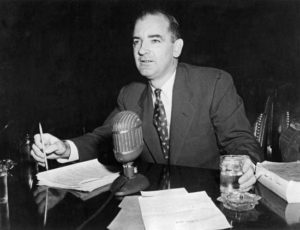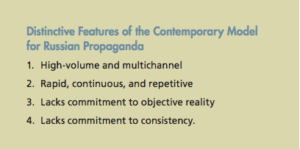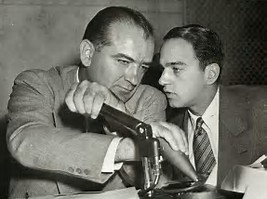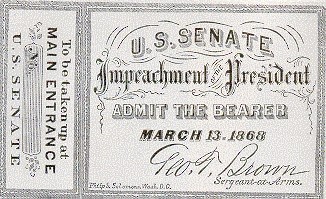Trump’s Constant Lying Has Roots in the Kremlin & Senator Joe McCarthy

Sen. Joe McCarthy (R-WI). He used fear-mongering, unsubstantiated attacks and outright lies to demonize a group of Americans in the 1950s. But instead of Muslims and immigrants, McCarthy targeted Communists.
‘Tail Gunner Joe’ would tip his hat to fellow con man Trump, who ironically cozies up to despised ex-KGB Vladimir Putin
The Washington Post Fact-Checker, the one that awards “Pinocchios” based on the perceived truth of a politician’s utterance, has its hands full these days. Obviously.
If you land on the Fact Checker’s “About” page, you’ll find the quote: “Comment is free but facts are sacred.” That about sums up its mission.
The Fact-Checker has found it necessary to keep a separate tally just to cover the man in the White House. The results are not pretty. In his first six months in office, Trump has made 836 false or misleading claims.
Donald Trump: “I don’t like these–I don’t like Pinocchios.”
At its peak, in a period of just under 26 hours covering the days July 24 and 25, 2017, Donald Trump gave two rally-type speeches, held a news conference and did his usual tweeting. In those approximately 26 hours, The Washington Post Fact-Checker counted 29 false or misleading claims. Who believes this will get better?
“Firehose of Falsehood”
A reasonable person would naturally ask: Why? Why lie so brazenly? Is it pathological? The debasement of the presidency and our democracy aside, why make assertions that can be so easily debunked?
It has to be that we’re missing the point.
An investigative news team at Mother Jones magazine recently got a hold of a RAND corporation study that examined communication techniques in Kremlin-controlled media. Based on some excellent research by RAND, a non-partisan entity, Mother Jones drew a distinct parallel between President Trump’s stream of lies and a form of Russian propaganda known as the “Firehose of Falsehood.”
There are four pillars to this technique (see graphic), but its fundamental aim is to overwhelm and exhaust the recipient with a deluge of multi-platform messages fired rapidly and repetitively with no loyalty to perceived truthfulness nor normal constructs of reality. It’s the old, throw a lot of paint against the wall and see what sticks.
The high volume matters, according to RAND because obviously, “messages received in greater volume and from more sources will be more persuasive.” Also, “repetition leads to familiarity and familiarity leads to acceptance.”
Still believe Trump will abandon his Twitter account?
What is shocking to many people is when Trump tells a lie that can be easily checked out and discredited. Examples abound: His popular vote total, his inauguration attendance, his taping of James Comey, his most recent contention that he has signed more bills than any president in US history.
RAND: “Stories or accounts that create emotional arousal in the recipient (e.g. disgust, fear, happiness) are much more likely to be passed on, whether they are true or not.”
The study warns: Don’t expect to counter the firehose of falsehood with the squirt gun of truth.
The Rise of Demagogues
The rise of Donald Trump has brought some unwelcome nostalgia about another political figure who is famous for his attack agenda. Senator Joseph McCarthy (R-WI) used his Senatorial committee in 1950 to make dubious claims about communist infiltration in President Truman’s State Department. “McCarthyism” entered the American lexicon as another word for demagoguery.
McCarthy and Trump shared similar tactics to intimidate their targets–fear-mongering, baseless defamation, innuendo and showmanship–with today’s Muslims and brown-skinned immigrants taking the place of McCarthy’s communist spies.
Donald Trump’s early contentions that Barack Obama was a Kenya-born Muslim meets the textbook definition of McCarthyism: undermining political opponents by making unsubstantiated attacks about a person’s loyalty to his country. For Trump, it was all about loyalty to him. The man could care less about America.
McCarthy’s Downfall a Durable Lesson
By 1954, Senator McCarthy’s committee began to inquire about communist infiltration into the US Army. The hearings were broadcast on live television, with an estimated 80 million people watching at least part of the proceedings. What the American people saw was not flattering to the Senator: a loud, mean-spirited man who berated witnesses and made accusations with the flimsiest of evidence.
At one point, as Army Counsel Joseph Welch challenged McCarthy’s assertion that a defense worker was a “subversive” because he belonged to the National Lawyers Guild, Counsel Welch made his famous plea that turned the tide of McCarthyism:
Senator, may we drop this? Let us not assassinate this lad further, Senator. You’ve done enough. Have you no sense of decency, sir? At long last, have you left no sense of decency?
Coda
McCarthy and McCarthyism collapsed for several reasons: Courageous journalists who would not let go of the story, Republicans who came around to put country before party and the American people witnessing a profoundly evil man.
Could that sound familiar? Who will step up and finally ask this president, “Have you no sense of decency”?





















































































































